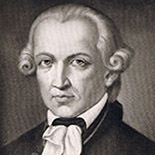 Immanuel Kant (April 22, 1724 – February 12, 1804) was a German philosopher who is widely considered to be a central figure of modern philosophy.
Immanuel Kant (April 22, 1724 – February 12, 1804) was a German philosopher who is widely considered to be a central figure of modern philosophy.
He argued that human concepts and categories structure our view of the world and its laws, and that reason is the source of morality. His thought continues to have a major influence in contemporary thought, especially in fields such as metaphysics, epistemology, ethics, political philosophy, and aesthetics.
Kant’s major work, the Critique of Pure Reason, aimed to bring reason together with experience and to move beyond what he took to be failures of traditional philosophy and metaphysics. He hoped to end an age of speculation where objects outside experience were seen to support what he saw as futile theories, while resisting the skepticism of thinkers such as David Hume.
Kant published works on ethics, religion, law, aesthetics, astronomy, and history. These included the Critique of Practical Reason, the Metaphysics of Morals, which dealt with ethics, and the Critique of Judgment which looks at aesthetics and teleology. He aimed to resolve disputes between empirical and rationalist approaches. The former asserted that all knowledge comes through experience; the latter maintained that reason and innate ideas were prior. Kant argued that experience is purely subjective without first being processed by pure reason. He also said that using reason without applying it to experience only leads to theoretical illusions. The free and proper exercise of reason by the individual was a theme both of the Age of Enlightenment, and of Kant’s approaches to the various problems of philosophy.
Kant is seen as a major figure in the history and development of philosophy. German and European thinking progressed after his time, and his influence still inspires philosophical work today. Twentieth-century thinkers who have been influenced by Kant include Max Weber and Friedrich Meinecke.